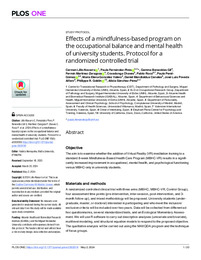Please use this identifier to cite or link to this item:
https://hdl.handle.net/11000/34898Full metadata record
| DC Field | Value | Language |
|---|---|---|
| dc.contributor.author | Lillo-Navarro, Carmen | - |
| dc.contributor.author | Fernández Pires, Paula | - |
| dc.contributor.author | Benavides Gil, Gemma | - |
| dc.contributor.author | Martínez-Zaragoza, Fermín | - |
| dc.contributor.author | Chaves, Covadonga | - |
| dc.contributor.author | Roca, Pablo | - |
| dc.contributor.author | Peral-Gómez, Paula | - |
| dc.contributor.author | González Valero, Maria Elena | - |
| dc.contributor.author | Mendialdua Canales, Daniel | - |
| dc.contributor.author | Poveda Alfaro, José Luis | - |
| dc.contributor.author | Goldin, Philippe R. | - |
| dc.contributor.author | Sánchez-Pérez, Alicia | - |
| dc.contributor.other | Departamentos de la UMH::Patología y Cirugía | es_ES |
| dc.date.accessioned | 2025-01-18T09:22:51Z | - |
| dc.date.available | 2025-01-18T09:22:51Z | - |
| dc.date.created | 2024-05-02 | - |
| dc.identifier.citation | PLoS One . 2024 May 2;19(5):e030201 | es_ES |
| dc.identifier.issn | 1932-6203 | - |
| dc.identifier.uri | https://hdl.handle.net/11000/34898 | - |
| dc.description.abstract | Objective The aim is to examine whether the addition of Virtual Reality (VR) meditation training to a standard 8-week Mindfulness-Based Health Care Program (MBHC-VR) results in a significantly increased improvement in occupational, mental health, and psychological functioning versus MBHC-only in university students.Materials and methods A randomized controlled clinical trial with three arms (MBHC, MBHC-VR, Control Group), four assessment time points (pre-intervention, inter-session, post-intervention, and 3- month follow-up), and mixed methodology will be proposed. University students (undergraduate, master, or doctoral) interested in participating and who meet the inclusion/ exclusion criteria will be included over two years. Data will be collected from different ad hoc questionnaires, several standardized tests, and an Ecological Momentary Assessment. We will use R software to carry out descriptive analyses (univariate and bivariate), multilevel modeling, and structural equation models to respond to the proposed objective. The qualitative analysis will be carried out using the MAXQDA program and the technique of focus groups.Discussion It is expected that with the proposed intervention university students will learn to relate in a healthier way with their mental processes, so as to improve their occupational balance (OB) and their psychological well-being. | es_ES |
| dc.format | application/pdf | es_ES |
| dc.format.extent | 20 | es_ES |
| dc.language.iso | eng | es_ES |
| dc.publisher | Board | es_ES |
| dc.rights | info:eu-repo/semantics/openAccess | es_ES |
| dc.rights | Attribution-NonCommercial-NoDerivatives 4.0 Internacional | * |
| dc.rights.uri | http://creativecommons.org/licenses/by-nc-nd/4.0/ | * |
| dc.title | Effects of a mindfulness-based program on the occupational balance and mental health of university students. Protocol for a randomized controlled trial | es_ES |
| dc.type | info:eu-repo/semantics/article | es_ES |
| dc.relation.publisherversion | 10.1371/journal.pone.0302018 | es_ES |

View/Open:
Effects of a mindfulness-based program on the occupational balance and mental health of university students. Protocol for a randomized controlled trial.pdf
718,8 kB
Adobe PDF
Share:
.png)
